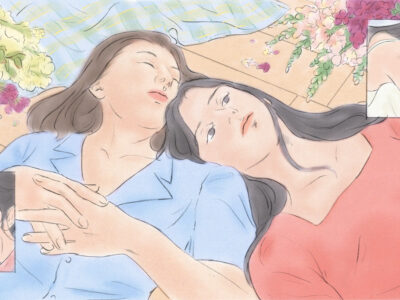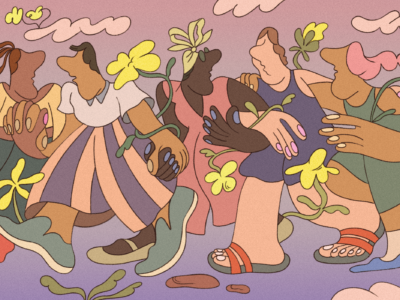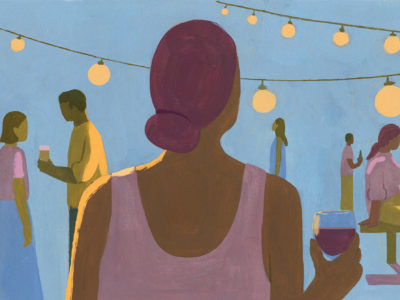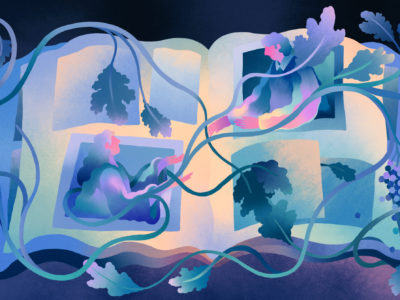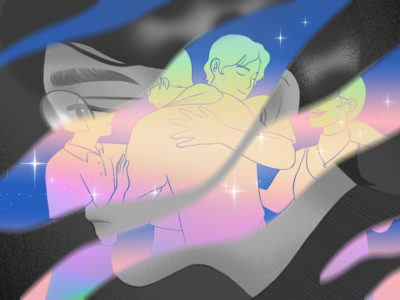WP_Post Object
(
[ID] => 9206
[post_author] => 15
[post_date] => 2025-08-07 16:43:47
[post_date_gmt] => 2025-08-07 16:43:47
[post_content] =>
How one woman's friendship helped guide me to myself.
“Old Friends” is an ongoing series exploring the many ways that friendship changes shape in adulthood.
I met Maryam at an Egyptian dance class in 2009, just outside Boston. We ended up on the same train ride back into the city afterwards, and got to chatting, about dance, about life. I was immediately at ease in her presence. Maryam’s big green eyes peered owlishly at me over wire frame glasses as we talked, and I was struck by the sensation that I was speaking to an elderly cartoon wizard who had transfigured, comically, into a freakishly gorgeous human woman. We also learned we were both students at the same college, and when she got off at her stop, we agreed to meet up on campus the next week.
I’m still not sure why Maryam wanted to hang out with me back then. At 21, I’d arrived to our friendship a myopic, self-centered mess of youthful immaturity. Unrecognized neurodivergence and unaddressed teenage trauma had glazed over my entire life, until everything was blurry. I was totally disconnected from myself beyond whatever my current fleeting hyperfixation, which often included chasing after some dehydrated headache of a man. I had no internal compass or intrinsic motivation to carve a deliberate path forward for my life.
In contrast, Maryam was poised, self-expressive, and independent in ways that awed me. Several years older and light years more adult, she moved through life with an enigmatic grace. Her home was full of art, films, perfumes, and books. Meanwhile, I still lived with my mom, and my room was full of…laundry.
I so desperately wanted to be like Maryam. A trained historian, herbalist, doula, and certified babe, this woman had it together. She taught me about feminist geopolitics, which plants would be good for my period cramps, and how to take care of my skin. She kept her fingers and toes manicured (red, always), and had a standing appointment at the nail salon for a polish change every Friday. It was the first time I’d met someone so devoted to herself; not in an egotistical way, but as a practice in self-respect.
“I never leave the house without at least a little makeup,” Maryam told me once. "My mother taught me that.”
Wow, I remember thinking. What a cool mom.
I haven’t spoken to my own mother much since middle school, but at 21, I was a full-time student who couldn’t yet afford my own apartment. Home, then, was a source of constant anxiety and stress; a gulf of silence, punctuated by unpredictable bouts of my mother’s wrath, a pattern that still defines our relationship today.
I cherished having an elder femme take me under her wing. I was a shy, only child, and my living situation had left me feeling pretty isolated. Time with Maryam often felt like an escape; like an alternate plot line where I felt a sense of belonging. Over time, I started to realize that I could actually live in that plot line, if I wanted to.
In the early years of our friendship, Monday nights were ours. Nearly every week, we went dancing in Cambridge, the notorious college town next door. We both had to be up early on Tuesdays, but that didn’t stop us—Maryam may have been responsible and mature, but we were both in our early 20s; still able to party all night and get up at 6 a.m. the next day. Whenever men would try to talk to us, we would start “joke dancing”: lurching and flailing our bodies around to scare away the would-be suitors, purely for our own amusement. When the night was done, I would drop her off and make my way back home in my mom’s Scion.
Maryam quickly became a mother figure to me, and helped me grow strong in ways that I needed, especially when I later stepped into sex work for the first time at 25. Through her, I was also able to see the ways my own mother had inadvertently taught me to hide from myself. My mom, a white woman who adheres to the principles of second wave feminism, raised me to believe that femininity was something that weak women performed for men. She was loud about her disdain, both for men and for femmes. She kept her hair short, never wore makeup, and still rarely wastes an opportunity to let me know she thinks my own femininity is frivolous.
But for all her convictions, my mother has also never been a confident woman; not when I was growing up, and not today. She is direct, entitled, and bossy in the ways that whiteness allows, but, when presented with everyday opportunities to disrupt things like misogyny, racism, or classism, she often stays silent, choosing decorum over the values she believes she holds.
The first iteration of my womanhood was steeped in the same temerity as my mother’s, something that required me to subjugate large swaths of my personality. I am, at my core, a belligerent lesbian with a smart mouth who capitulates to no one. I just didn’t know all of that yet at 21, and Maryam’s friendship helped guide me to myself.
In many ways, just meeting her was a revelation. She embodies a multiplicity that my mother’s idea of feminism can’t compute; a multiplicity that, though different from mine, allowed me to better understand my own contradictions, not as shortcomings, but as evidence of the shortcomings of the patriarchal culture around me. Maryam is brave enough to speak her mind, especially when it comes to standing up to men—even though as a mixed race, high femme, feminist hijabi, she faces a unique set of risks that often compound when she does so. Once, as a new mother, she noticed a man following a woman down the street, harassing her. With her infant strapped to her chest, Maryam began loudly heckling him, and he panicked and ducked into a store. She followed him inside and continued to roast him in front of shoppers.
I wonder if she gets this ferocity from her own mother, Karla, who died suddenly, shortly before Maryam and I first crossed paths. I wonder, too, what it was like for Maryam in the early years of our friendship, to guide me so thoughtfully and patiently through life as she grappled, mostly alone, with her monumental loss. She, like me, is an only child, and she lived with her mom until she died.
I also wonder what it was like to be raised by someone so tough. My favorite story about Karla, who was an artist, is the time that she was working in her studio and accidentally slashed her flesh. She cauterized her own wound with a cigarette, because, according to Maryam, “She couldn’t be bothered with the fuss of the ER.”
So unlike my own mother’s lip-service, Maryam taught me to hold my ground, go with my gut, and never let a man push my boundaries. Wise, wise advice for anyone to heed, but especially for a young person heading into the sex industry, like I did, just a few short years into our friendship. I am 36 at the time of this writing, and I have been in various types of sex work for over a decade. I started out as a stripper, and Maryam was one of my most supportive friends. She immediately understood the complex web of reasons why sex work may be the best choice for some people; even people like me, who have a college degree and other potential career options. Her steadfast support helped me keep my head on straight when others, including my mom, tried to make me feel bad about myself for dancing. And her support never wavered. During our brief but glorious stint as roommates, she would perform parody dances for me in the living room, twerking in a handstand on the wall to strip club classics, like T Pain’s I’m in Love (With a Stripper). Once, during one of my shifts at the club, the bewildered bouncer came inside to let me know that Maryam had tried to come visit me at work—with her new baby asleep in the carriage.
In stark contrast, when my biological mom found out through the grapevine that I had been dancing, she lost it. Even though we barely spoke, she used any contact as an opportunity to let me know she was mortified by my choices. She tried to shame me out of my job, eventually using her own mental health as a manipulation tactic, blaming my stripper status for her anxiety and depression.
I don’t resent my mother for this, I don’t hate her. But I also don’t feel known by her. And when I was younger, I needed to feel known, to feel understood—to feel mothered.
For an off-the-wall autist, pinballing through her early adulthood, Maryam’s care was a lifeline. Her lessons in self respect also helped me shift paradigms in my personal life. Eventually, as I matured, I started to put less attention into toxic relationships and instead focus on building a relationship with myself. I have my own apartment now, full of my own art, music, perfumes, and books. (I’m still locked in a chronic battle with my laundry, though—some things don’t change.) Gradually, as I grew up, my friendship with Maryam changed, too: In the 15 years since we met, she’s had kids, I’ve figured out I’m queer, and we’ve both begun to contend with the ways that time takes a toll on the body; the ways that life shapes the spirit and the mind.
Part of me will forever feel like a clumsy little kid, chasing after Maryam with a lollipop tangled in my hair, but, in general, I feel pretty well equipped to take care of myself. Now, I’m also someone Maryam calls in a crisis, someone she vents to when she has a problem; not just the other way around. I feel rewarded by having earned her trust over the years; a kind of trust that I still don’t get from my own mom.
I’ve also had my own experiences now, mothering younger friends and relatives, and in those situations I often find myself emulating Maryam, trying to strike a balance of grace and leadership; trying to teach my little ducklings to be strong and brave.
It took a long time for me to see just what it meant for Maryam to show up for me like she did in those early years, especially as she was learning to navigate life without her mom. She was attentive to me in ways for which I previously had no barometer; she validated my dreams, recognized my hard work, and showed me care in simple ways, like learning which foods were my favorites, or reminding me my worth every time some dingus broke my heart. On the other hand, my own mother has asked me twice in the past decade what color my eyes are, refuses to believe that I am autistic, and, just before I started grad school for journalism last fall, decided to tell me why she thinks I’ll never be a good journalist.
Since my own mom is mostly a stranger to me, it’s hard for me to imagine what it’s like to lose a bond I never had. But through mine and Maryam’s friendship, I have caught glimpses of Karla, and have come to love her through Maryam’s eyes—to recognize the woman who mothered the woman who mothered me.
When I look back at the ways that Maryam helped guide me in my lost, immature years, or when I reflect on what a spectacular mom she has become to her own children, I am awash with the strange sense of missing someone I never had a chance to meet. I can feel Karla’s presence in so much of Maryam’s life, and, by extension, so much of my own.
It’s been over ten years since Maryam and I lived in the same state. She’s raising a family with her husband in the Midwest, and I’m running around, a gay, sex working journalist in New York. I miss her so much. I keep photos of her and her kids in my studio, along with a pair of Karla’s old boots: a reminder that my best friend is always with me, and of the multigenerational blessings she brings to my world; and of the many mothers, here and gone, who continue to watch over me.
[post_title] => The Cycle of Mothering
[post_excerpt] => How one woman's friendship helped guide me to myself.
[post_status] => publish
[comment_status] => closed
[ping_status] => closed
[post_password] =>
[post_name] => old-friends-friendship-mothering-growing-up-self-understanding-personal-essay
[to_ping] =>
[pinged] =>
[post_modified] => 2025-09-19 12:32:12
[post_modified_gmt] => 2025-09-19 12:32:12
[post_content_filtered] =>
[post_parent] => 0
[guid] => https://conversationalist.org/?p=9206
[menu_order] => 2
[post_type] => post
[post_mime_type] =>
[comment_count] => 0
[filter] => raw
)





